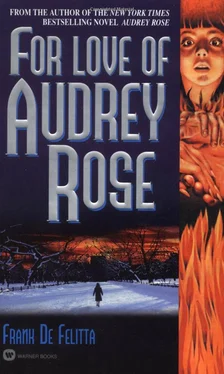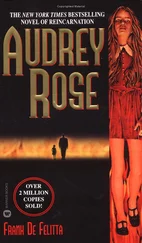“Elliot!” she screamed.
She could not even hear her own voice. Lightning illuminated the village. There were three structures standing and two structures with only walls. A dog was frightened and half swam, half walked uphill against the moving mud, its coat matted and slicked back until it looked like a wart hog. The darkness returned, and with it a low roar was heard under the storm: a house had collapsed, its clay and timbers were crashing together.
“Elliot!”
It was absurd. The dog was also howling. But the only thing audible now was the driving rain and the sucking, sliding mud. The mud had become more liquid, and it flowed faster downhill and around the standing houses, eddying, pushing, relentless. The support over Janice’s head blew off and, soaked to the skin, she saw the mud coming her way.
She groped out into the night. An electric wire somewhere was live, flashing and spitting sparks where it flapped hideously at the violent trickles of water. Figures were moving inside, but there were no lights, and they looked as helpless as the dog. Far in the distance a piece of the hill bulged behind the outpost. Then it opened up into five holes and spouted water like a fountain. The dark earth vomited forth and shot forward into the outpost with the force of the water. A small supply truck tipped over slowly, grandiosely, like a ballet of elephants. With horror Janice saw the distant remnants of the army fighting for their lives, ignoring cries for help, grabbing and kicking for higher ground.
Janice looked around her. A raft went by — a morass of saplings, mud, a piece of religious shrine, and a screaming cat — right where her hut had been. Janice panicked, but her legs found incredible strength, and they dug against the oozing mud. Her arms paddled at the heavy liquid around her calves. The only thought in her existence now was higher ground, higher ground. A crimson robe floated by, oddly elegiac, like Ophelia, on the vicious waters. Janice screamed.
The water plastered her trousers to her legs, her shirt to her breasts. She felt soaked as she had never felt soaked. Her hair was a dense black mass, heavy and sodden, lumped in front of her eyes. She reached for a firm root, but the root slid upward out of the liquefied earth. Janice fell backward, rolled into the rushing water, and smelled the noxious odor of the red clay in her mouth.
Tiny sharp bits — gravel or nails — stung her face. She fought to stand up, but her feet were being washed out of the mud, until there was no mud, nothing to stand on, only water. She was being pulled downstream. She swam, her arms and legs kicking in unison, swallowing the heavy water that slammed at her face. Her lungs were bursting; there was no way to breathe in the ferocious river. She felt herself trailing away, falling backward into a deep darkness, down river, down the hill, always downward into the maelstrom.
Her arms clutched something that floated. She threw her clinging hair to one side and looked behind her. Matted clumps of army boxes, blankets, and food tins bobbed up and down, catching the light of a cold gray day. The rain came down like a wall. There was no village. Only a moving river of mud, water, and bits of things that had once been huts, fences, or chairs. A piece of colored cloth rapidly floated by, and Janice remembered the crimson robe. Desperately she turned to look down the stream, and then she saw what she was clinging to: two dead goats, their forelegs locked in a death embrace.
Janice screamed, but her arms only grappled tighter against the cold, hairy forms, feeling the bones underneath. Somehow there was sufficient air in their bellies to keep them afloat. There was no sense of a river anymore, only an angry ocean of currents going in opposed directions, filling the valley, destroying everything it reached.
Far away in the darkness, form crumbled from form, and Janice knew that the hills were giving way. Huge splashes showed where boulders and entire trees on the upper slopes were rolling into the rising water. Lightning cracked in two places. Janice sensed utter physical defeat, and her arms grew weak. In horror, feebly protesting, her cramped fists beating uselessly against her fate, she saw the monsoon rip her two dead goats away, and the muddy taste knocked into her nostrils again.
Then eternity seemed to pass through her. It was loathsome and dark and vicious. She had no will, no intelligence, only a small spark of something that was afraid. It was as though she did not exist. Strange sounds, like bells, clanged far away. She felt no sensation in her legs or arms, or even her head and chest. Something dark was coming to reclaim her, to make her disintegrate once again.
Sounds of the monsoon; her head was above water; a knock from a dislodged timber; screams of iron wrenched from its beams; something steady underfoot, dislodged, whirling around; a whirlpool, falling, with timbers. The small spark inside flickered, tried to go out; lungs bursting, on fire, under water…
Rough hands. She knew the sensation. Rough hands, callused. With bone underneath. Along her shoulder and back. An illness, a nausea that she could not expel, shot through her. The roaring was inside, not in the storm. The rough hands dragged her upward. She sensed her own feet, far away, dragging through slimy mud. She wanted to open her eyes, but they were closed in the opiate of a leaden fatigue. Just then a sheet of pain flared along her left leg.
“Elliot!” she blurted.
Still she could not open her eyes. An undulating green roof seemed to be lifting in front of her. Something was under the stinking roof: it was herself, in some way, the remnants of what she was. She felt warmth everywhere like a fever, and she knew she was alive.
She opened her eyes. A mud plain stretched under her feet. Around her were dead bodies, most bloated, naked, their genitals scarred, their arms and faces caked with mud, their eyes squeezed sockets where the skulls had caved in. There was no river, no village, not a tree, not a blade of grass — just the mud, with a thousand sloping channels where the water had receded. A cool drizzle plopped into the mud, making a million tiny holes.
Janice was being dragged up the slope. Her two feet made a trail that stretched as far as she could see. Suddenly she passed a huge bulk: a dead bull, its front legs folded peacefully underneath, its enormous horns jammed into the mud. Still she was dragged higher. Just as she wondered who was pulling her, and turned to look, the curtains seemed to come down again, and she slipped into nothingness.
Slowly her eyes opened. She was in a large room. The ceiling was mottled with decay and mildew, but it was dry. Two naked light bulbs hung from the ceiling, both on, even though the small windows showed it was day. Rain came down on the roof, but it was a smaller rain. Janice heard a chorus of moans. She turned her head. Next to her was an aged woman’s face, the hands tucked under the cheek, the mouth and eyes open in silent horror, dead.
She was in a makeshift hospital. At least that was what it looked like. Two doctors in dirty white coats, pockets bulging, pants soiled by mud, pus, and streaks of dried blood, darted among twelve mattresses on a cold stone floor. The doctors were both North Indian, with the longer, more oval faces and slender noses. They were totally fatigued, their eyes glazed with weariness, and they stumbled as they walked, barking orders, irritated. Wails rose from the twelve beds; Janice realized her own mouth was giving out moans, and she grew silent.
Through the door the smaller, darker South Indians were visible. Two of them hauled a corpse up from the mud. They all wore handkerchiefs over their mouths and nostrils. A fire burned ferociously despite the rain, and Janice watched in fascinated horror as the corpse was laid, with the barest formality, on top of the flames. She turned her head to avoid the charring of flesh.
Читать дальше












